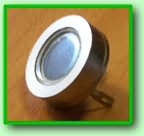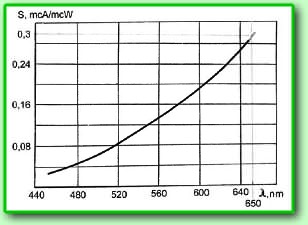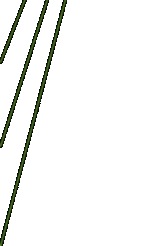|
Determination of exposing time
of holograms
All
the holographers familiar with the situation, when
the hologram is not properly exposed - brightness
of the hologram is low, there is a veil on all its
surface etc. We offer the simple and rather precise
method of definition of optimal exposing time of
the hologram. For this purpose it is necessary to
measure illumination intensity E of a photoplate.
As the hologram is recorded by monochromatic laser
light, the measurements of illumination intensity
are necessary to carry out in energy units, for
example, in mkW/cm2 [4].
It is necessary to refuse usual photometer devices
such as luxmeters, because they are designed for
measurements in white light.
 The silicon photodiodes are
most suitable for measurements in holography, that
have a high light sensitivity, good linearity in
a broad band of photocurrents, big size of a photosensitive
surface, opportunity to work in a photovoltaic mode,
without the power supply. We recommend as a measurer
of a photocurrent the microammeter, that have broad
band of measured currents - from 50 nA up to 50
mA (figure shows FD-7k photodiode, which is popular
in Russia). The special measurings have shown very
good linearity of recording of photocurrents on
all bands for a pair: such special photodiode -
microammeter. It allows one to determine illumination
intensity and, accordingly, the time of exposing
of the hologram depends on value of a photocurrent
under the simple formula with use of scaling coefficient
K. The silicon photodiodes are
most suitable for measurements in holography, that
have a high light sensitivity, good linearity in
a broad band of photocurrents, big size of a photosensitive
surface, opportunity to work in a photovoltaic mode,
without the power supply. We recommend as a measurer
of a photocurrent the microammeter, that have broad
band of measured currents - from 50 nA up to 50
mA (figure shows FD-7k photodiode, which is popular
in Russia). The special measurings have shown very
good linearity of recording of photocurrents on
all bands for a pair: such special photodiode -
microammeter. It allows one to determine illumination
intensity and, accordingly, the time of exposing
of the hologram depends on value of a photocurrent
under the simple formula with use of scaling coefficient
K.
 Figure shows the diagram of
relationship between sensitivity S(l) and wave length
for the special photodiode, which is recorded in
a band of wave lengths including the basic line
of generation of lasers: 488 nm, 514 nm and 633
nm.Scaling coefficient can be calculated from the
expression: Figure shows the diagram of
relationship between sensitivity S(l) and wave length
for the special photodiode, which is recorded in
a band of wave lengths including the basic line
of generation of lasers: 488 nm, 514 nm and 633
nm.Scaling coefficient can be calculated from the
expression:
K = 1/S(l)*A, mkW/(mkA*cm2),
Where
S(l) is spectral sensitivity of the photodiode,
mkA/mkW, A - photosensitive surface of the photodiode,
cm2.
There are in the table
below the coefficients calculated for three wave lengths of the laser at a diameter of a
diaphragm on a surface of the photodiode 3 mm. The complete diameter of a photosensitive
surface of the photodiode is equal 8 mm and it not always suitable for precise
measurements of illumination intensity from an object beam.
| Wave length, nm |
S(l) |
K |
488 |
0.05 |
280 |
514 |
0.08 |
170 |
633 |
0.25 |
50 |
The
determination of illumination intensity of a photoplate E is multiplication of value of a
photocurrent I, measured in mkA on scaling coefficient K.
E = K*I, mkW/cm2
The
exposing time T, corresponding to necessary energy
of exposing Q, mkJ/cm2, is determined
by the formula:
T = Q/E, s
Where E is summary
illumination intensity of beams, recording the hologram, in a sectional point of a
photoplate expressed in mkW/cm2.-->
|





